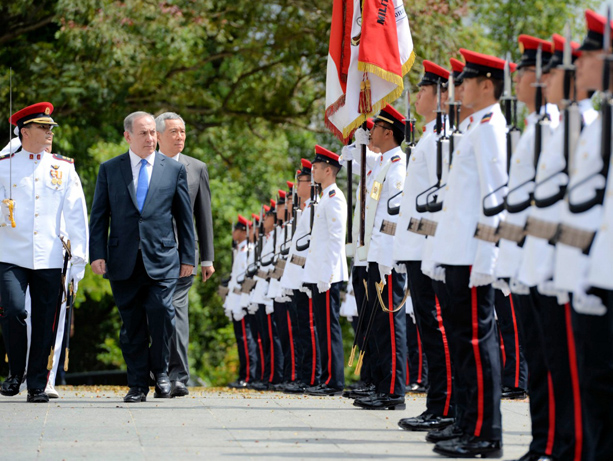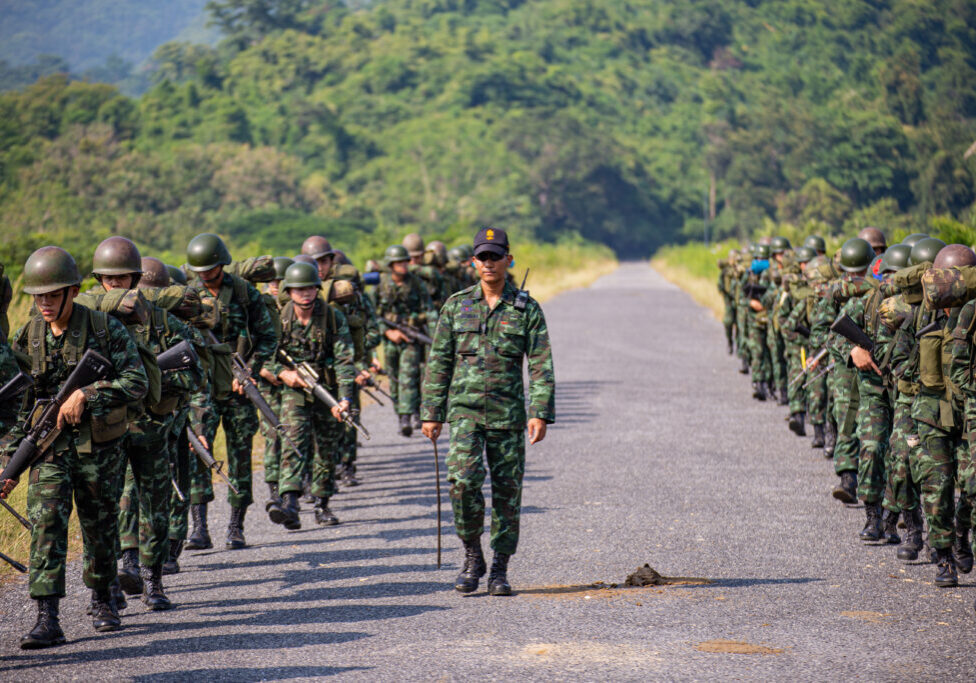Australia/Israel Review
Bibi’s historic Singapore swing
Mar 2, 2017 | Glen Falkenstein

Glen Falkenstein
“Perfectly poised between China and India is Singapore – and I’m not speaking merely in a geographic sense. I’m saying that as a gateway to Asia, Singapore is a perfect partner.”
Israeli Prime Minister Binyamin Netanyahu’s remarks at this week’s dinner with Singaporean Prime Minister Lee Hsien Loong are emblematic of a multifaceted bilateralism that has seen once clandestine engagement between the two nations grow into a very public, and profitable relationship.
Right off the back of Netanyahu’s much-publicised trip to Washington to meet with the new Trump Administration, the Israeli PM boarded a plane to Singapore for a two-day visit, the first occasion where an Israeli Prime Minister has officially visited the country. This preceded his scheduled visit to Australia – also a first for a sitting Israeli PM.
In addition to the official events, the trip included a meet and greet with Singapore’s 2,500-member Jewish community – something Netanyahu also mentioned as a highlight while later visiting Australia.
Addressing a weekly cabinet meeting prior to his departure, Netanyahu asserted, “What we are doing is to strengthen Israel’s standing in the world, and this was apparent during my visit in Washington, as it was during my previous visits to the Islamic world and now to Australia and other major powers in Asia. And it is clear that there is also an economic aspect here – to open new markets. This is one of the things that contribute to strengthening Israel’s economy.”
Addressing the official dinner hosted by PM Lee in Singapore, Netanyahu, for whom an orchid was named at the event, highlighted the historic and unique relationship between the two tiny Middle Eastern and South East Asian nations – including a new program of joint aid programs in third countries:
“I think there’s a great battle that is taking place right now in the world in the beginning of the 21st century and we all have a stake in making sure that tolerance, diversity and progress win the day; that modernity wins the day against barbarian medievalism.
“I think this is something that is shared by everyone, by our societies, by the countries of the West, the countries of Asia, the Muslim world itself.
“I sense a great change in the Arab world in many Arab countries, and I hope, as we discussed earlier, to be able to use that newfound attitude towards Israel to help to solve the Palestinian-Israeli conflict as well. This is something that we’re making a lot of efforts to, most of them are, so we say, not publicised, not public.
“Equally, there is one thing that I can say about the exceptional achievements of Singapore. I think that the fact that we are working together, we are cooperating in the economy, in trade, in technology, in medicine, in every field. I think this strengthens both our countries.
“We spoke today about collaborating in third countries. We’re already doing that in one African case, I think we should do it in many countries in Africa, in many countries in the Pacific. I think we have a lot to offer humanity and our success in not only the betterment of our own societies and our own peoples but we can carry this progress far and wide.
“Israel is pivoting towards Asia in a very clear and purposeful way… We believe in Singapore, we admire Singapore, we admire the consistent leadership and vision that you had and that you continue to exemplify, Prime Minister.”
Speaking of regional stability and the requirements of peacemaking following a meeting with Netanyahu, Lee commented:
“People all over the world are seized with the Israeli-Palestinian issue. We ourselves have a significant Muslim population, who are an important part of our harmonious multi-racial society… We have consistently believed that a two-state solution between Israel and Palestine, however hard to achieve, is the only way to bring peace and security to both peoples.
“Singapore has long opposed unilateral actions to advance a peace agreement, with the Government stating in 2012 that both sides have legitimate rights and shared responsibilities, and must be prepared to make compromises to achieve the larger good of a lasting peace. It is precisely because the rights and responsibilities of both sides are inextricably intertwined that no unilateral move can result in a just, peaceful and durable outcome.”
“Singapore and Israel are old friends,” Lee also added, “This ensured our survival at a time of great uncertainty and vulnerability… We will always be grateful. Since then, our ties have expanded beyond defence and security.”
Lee himself visited Israel in 1977 as an army officer and in April of last year became the first Singaporean Prime Minister to visit the country, leading a delegation on a four-day mission.
Historically Lee’s father, Lee Kuan Yew, who is also the father of Singapore as a booming city-state, sought Israel’s help to defend Singapore’s newfound borders following the establishment of the country in 1965.
More recently, leaders from both countries have taken the long trip to shore up relations, further expanding their once secretive bilateral co-operation on defence – including Israeli President Reuven Rivlin who travelled to Singapore early last year.
During his own visit to Israel last year, Lee praised Israel’s historic actions in aiding nascent Singapore, stating, “It all started with a defence relationship. We are very grateful to Israel that when independence was thrust upon us in August 1965 and when Singapore’s security and survival were in doubt, you helped us, the IDF helped us to build up the Singapore Armed Forces [SAF] when other countries turned us down.”
With a reported US$1.35 billion in trade passing between the two countries in 2015, a recent memorandum on foreign aid affirms that the two nations will jointly be “providing training in various spheres of development (economic development, innovation, health and sustainable development) to professionals from developing countries around the world.”
With both countries serving as world leaders in innovation and information technology, Singapore has become a hub in South East Asia for Israeli business and start-ups, with Singapore’s burgeoning technology sector also benefiting from reciprocal agreements and exchange with their counterparts in the Jewish state.
As PM Lee noted, a relationship that began with Singapore’s urgent defence needs now extends well beyond military ties. With Israeli foreign policy now engaged in “pivoting towards Asia in a very clear and purposeful way,” as Netanyahu stated, Jerusalem is clearly depending on Singapore to be a linchpin of that strategy. Netanyahu’s successful visit only reinforced how the unique similarities between the two countries and already close collaboration will likely bring the relationship to new heights in coming years.






